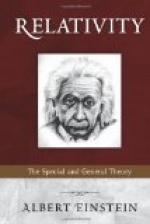The principle of relativity requires that the law of the concervation of energy should hold not only with reference to a co-ordinate system K, but also with respect to every co-ordinate system K1 which is in a state of uniform motion of translation relative to K, or, briefly, relative to every " Galileian " system of co-ordinates. In contrast to classical mechanics; the Lorentz transformation is the deciding factor in the transition from one such system to another.
By means of comparatively simple considerations we are led to draw the following conclusion from these premises, in conjunction with the fundamental equations of the electrodynamics of Maxwell: A body moving with the velocity v, which absorbs * an amount of energy E[0] in the form of radiation without suffering an alteration in velocity in the process, has, as a consequence, its energy increased by an amount
eq. 19: file eq19.gif
In consideration of the expression given above for the kinetic energy of the body, the required energy of the body comes out to be
eq. 20: file eq20.gif
Thus the body has the same energy as a body of mass
eq.21: file eq21.gif
moving with the velocity v. Hence we can say: If a body takes up an amount of energy E[0], then its inertial mass increases by an amount
eq. 22: file eq22.gif
the inertial mass of a body is not a constant but varies according to the change in the energy of the body. The inertial mass of a system of bodies can even be regarded as a measure of its energy. The law of the conservation of the mass of a system becomes identical with the law of the conservation of energy, and is only valid provided that the system neither takes up nor sends out energy. Writing the expression for the energy in the form
eq. 23: file eq23.gif
we see that the term mc^2, which has hitherto attracted our attention, is nothing else than the energy possessed by the body ** before it absorbed the energy E[0].
A direct comparison of this relation with experiment is not possible at the present time (1920; see *** Note, p. 48), owing to the fact that the changes in energy E[0] to which we can Subject a system are not large enough to make themselves perceptible as a change in the inertial mass of the system.
eq. 22: file eq22.gif
is too small in comparison with the mass m, which was present before the alteration of the energy. It is owing to this circumstance that classical mechanics was able to establish successfully the conservation of mass as a law of independent validity.




